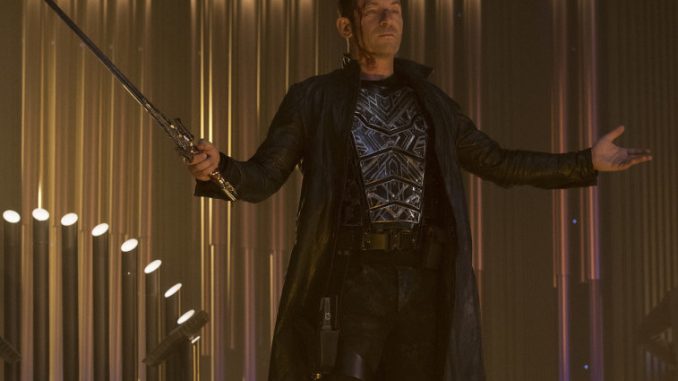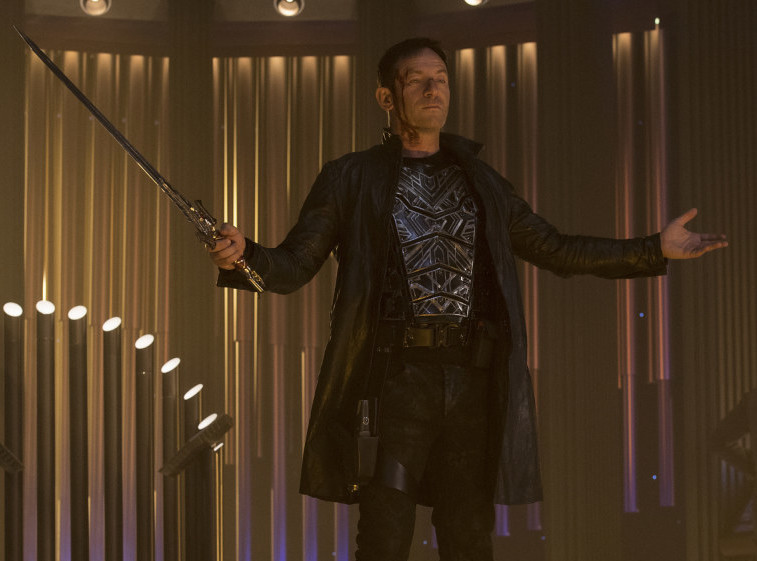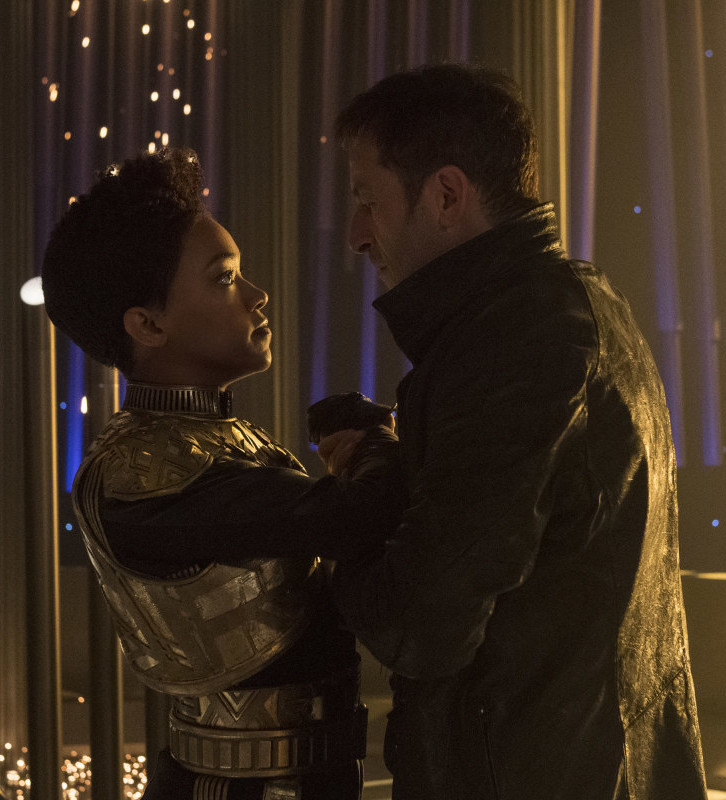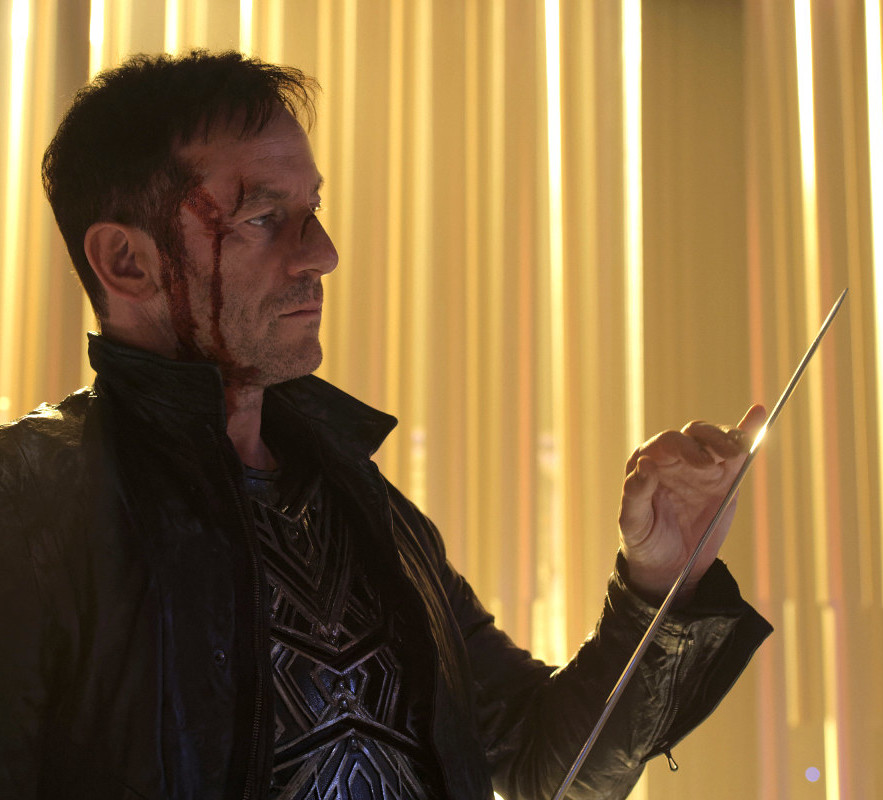
Warning: The following story contains MAJOR SPOILERS for the Jan. 28 episode of Star Trek: Discovery.

Jason Isaacs on Star Trek: Discovery.
Ben Mark Holzberg / CBS
Last September, the cast and crew of Star Trek: Discovery assembled together on a dark and smoldering Toronto soundstage to do something no previous Trek TV series had ever done before: Say goodbye to its captain. The previous episode had ended with the shocking reveal that Gabriel Lorca, the mysterious commanding officer of the titular starship the USS Discovery, is actually from an alternate universe, known to Trek fans as the Mirror Universe, in which Earth is the center of a humans-only galactic empire. And after playing Lorca for 11 episodes, Jason Isaacs had just shot his (seemingly) final scene on the show, in which his soldiers attempted a coup against the despotic Emperor Georgiou (Michelle Yeoh).
Spoiler alert for the episode, which is currently available to stream in the US on CBS All Access (and on Netflix just about everywhere else): Lorca’s coup fails, and Georgiou literally stabs him in the back before incinerating his body in space. On the set, the farewell for Isaacs was considerably more heartfelt, with the dozens of assembled actors, producers, writers, and other crew members showering Isaacs in applause. One of those castmates, Anthony Rapp, even broke into a cheer: “Best worst captain! Best worst captain!”
The moment was the result of nearly a year’s worth of careful collaboration between Isaacs and Discovery‘s writers to craft Lorca’s arc on the show from the very first time his character appeared in Episode 3. It also required Isaacs to spend almost as long hiding his character’s true nature.
“It’s been embarrassing/awkward/torturous lying to so many people, including close friends and family members, but particularly to the press, and indirectly to the public,” Isaacs told BuzzFeed News last week in a phone interview. “But Star Trek fans particularly are incredibly smart and highly attuned to every nuance in the story. So you just couldn’t give them a clue.”

Sonequa Martin-Green and Jason Isaacs on Star Trek: Discovery.
Ben Mark Holzberg / CBS
Months earlier on the set, when asked about why he wanted to go through all this subterfuge, Isaacs was blunt. “I wanted to say something about Trump,” he said. “They’ve done Star Trek brilliantly. The only reason to do it again was to tell a story that has some modern resonance. It’s such a horribly, unbelievably decisive time — to be part of a story that explores that makes it a very unusual experience.”
Unlike the egalitarian ideals of the United Federation of Planets at the heart of the main Star Trek universe, the Terran Empire within the Mirror Universe treats all other alien species as inferior and subservient to humankind. “The Terrans [are] authoritarian, xenophobic,” said executive producer Aaron Harberts. “You get ahead by stabbing people in the back. Relationships are all about what you get out of them and nothing more. It has everything to do with, I think, where a certain faction of our country is right now.”
Harberts explained that the writers knew from the start, when creator Bryan Fuller was first planning out the show’s serialized storyline, that the inaugural season of Discovery would end up in the Mirror Universe. (Fuller eventually left the show due to creative differences with CBS, elevating Harberts and Gretchen J. Berg to showrunner status.) But at first, the writers planned for Lorca to be a hawkish captain given a chance to shine thanks to the Federation’s war with the Klingon Empire. It was only after the writers began discussing why Lorca would be so skilled with warfare that they hit upon the idea that he’d secretly be from the militaristic world of the Mirror Universe.
Typically, showrunners keep their actors in the dark about any major twists in store for their characters — it helps contain the surprise, and saves the actors from having to actively lie about the role. But given that Lorca would have his own secret agenda throughout the season, Harberts and Berg realized they had to tell Isaacs about their plan for the character from the start.

Jason Isaacs in Star Trek: Discovery.
Ben Mark Holzberg / CBS
“At first, they weren’t quite sure how he was going to get back [to the Mirror Universe],” said Isaacs. So, the actor said he insisted they all come up with a clear blueprint for the character. “That’s the only way I can usefully play the thing,” he said. “I can’t just play a notional secret, I have to play an actual secret and a plan. So we bashed out a plan together, and the scripts ended up sticking to it. So yeah, I had the whole season in my head before we started.”
Isaacs balked, however, when asked about his declaration on set in September that one of his main reasons for taking the part was the opportunity to comment on the president of the United States.
“Oh, did I really say one of the main reasons is because I could say something about Trump? Surely not,” he said. “If I did, I take it back. I mean, I did the role because it’s a fantastically layered story, and it’s got twists and surprises. … I didn’t take it because of anything political at all. I’d retract that.”
Lorca’s words in his final episode — declaring that “Terrans need a leader who will preserve our way of life, our race,” and that “every species, every choice, every opinion is not equal, no matter how much they want it to be” — do sound awfully familiar.

Jason Isaacs on Star Trek: Discovery.
Ben Mark Holzberg / CBS
But presently, to Isaacs, Lorca’s bigoted and parochial worldview was more about evoking a nationalist and isolationist ideology that transcends today’s headlines. “[Lorca’s] a liar and a manipulator, and obviously thinks that might is right, and he thinks that he can get anyone to do what he wants,” he said. “He’s also a racial purist. He’s all about … [that] everybody has a place, and there’s a natural hierarchy that needs to be respected. Those views unfortunately are heard on the stump all over the country, and all over the world quite often. … One of the great joys of sci-fi is you can examine the world that you live in [through] a fantasy prism, but only so that it allows you to distance yourself from the kind of nonsense of partisan politics.”
Another popular sci-fi trope often embraced by Star Trek is the ability to transcend death, a plot development that’s already cropped up once on Discovery’s first season. So while Lorca’s body is now well and gone, could he possibly return in some other form?
“If you’re asking if I come back at all,” Isaacs said with a chuckle, “you’ll have to get in line behind my wife and kids, who I won’t tell either.”

